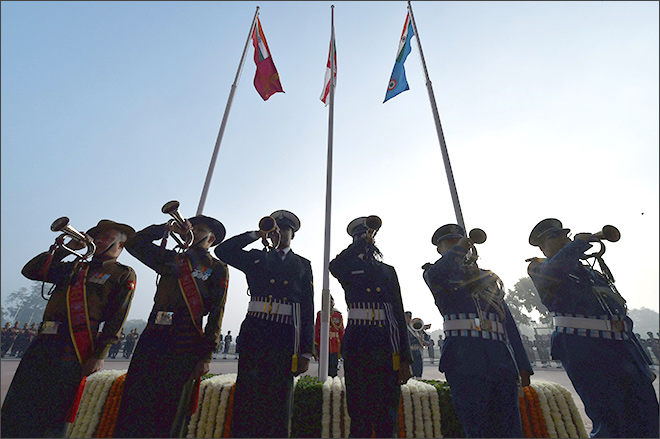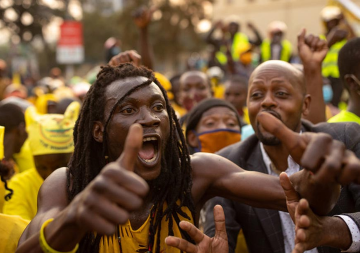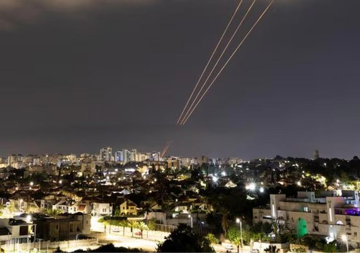
War is politics by other means, said Karl Von Clausewitz, the Prussian military strategist in the eighteenth century. As societies change, and politics changes, so does the nature of war, and the battlefields wars are fought on. The two weeks since the Pulwama attack has shown us that the battlefield is now also on television and social media. If the war has to be won or lost, it must also be fought on these new fronts. As tensions and tempers peaked after the Pulwama attack, bloodlust, and the thirst for revenge was let loose on Kashmiris living in other parts of the country — violence that went unchecked by the very highest levels of government, as though finding some enemy to target was better than finding none. But those clamouring for revenge from the safety of their homes, urging our forces into battle, confident that India has the upper hand militarily have since been chastened, as the harsh reality of the costs of war dawned with Wing Commander Abhinandan Varthaman’s capture by the enemy. Those who were euphoric that India has sought ‘revenge’ for the terror attack that killed over 40 CRPF jawans on 14 February 2019 by launching air strikes at a Jaish-e-Mohammed camp inside Pakistan twelve days later, swung to despondency as Islamabad announced it had captured the Indian Air Force pilot alive, the next day, again only to be released as a ‘goodwill’ gesture by the Pakistan Prime Minister Imran Khan. Videos of the pilot, and of Imran Khan’s speech swirled on timelines and newsfeeds. The media is a tool and a weapon rolled into one, and nowhere was this more evident as in the last 48 hours during which India won and lost so quickly.
Today, as a nation, India is thankful that its Air Force pilot is returned safe. Even 48 hours in enemy captivity (Geneva Conventions, notwithstanding) was 48 hours too many. In defending India’s military infrastructure as Pakistan retaliated against Indian air strikes, Varthaman disregarded the risks to his own life, was loyal to his pledge to defend the country, and is now rightfully, a hero to us all. Now that he is back, and the shrill, bloodthirsty rhetoric of the past week is behind us, it is a good time to take serious stock and address uncomfortable realities that have been brought home. Undoubtedly, India has shown it is now prepared to use conventional combat strategies to target terror, albeit still unsure of whether governments or militaries are ready to pay the cost in human life. The tension over the pilot’s detention by Pakistan not even a day after euphoria tells us that is not an easy question to answer.
Today, statements from Beijing in the wake of the Pulwama attack show that even China may just find it hard to look the other way as Pakistan obfuscates on action against Azhar, and the prospect that India can act militarily becomes a real one.
But perhaps most importantly, the last few days have reminded us that no war can be won without good diplomacy. As international condemnation for the Pulwama attack came in swiftly, India stepped up its diplomatic efforts urging the world community to proscribe the Jaish-e-Mohammed chief Masood Azhar as a global terrorist — a demand that has been consistently blocked by China at the UN Security Council. Today, statements from Beijing in the wake of the Pulwama attack show that even China may just find it hard to look the other way as Pakistan obfuscates on action against Azhar, and the prospect that India can act militarily becomes a real one. Numerous news reports have indicated that Wing Commander Varthaman’s release was a result of direct intervention by the United States, Saudi Arabia and the United Arab Emirates who spoke to the Pakistani leadership amidst growing international concern over an escalating conflict between two nuclear armed countries.
In diplomacy, language matters, and the strong vocabulary of isolating Pakistan diplomatically that found wings after the Uri attack of 2016, might need to be re-configured. After all in spite of India’s insistence on dealing with Pakistan and resolving the Kashmir dispute ‘bilaterally,’ without outside intervention, perhaps we need to ask if isolation and mediation — as antithetical as they sound — could be two sides of the same coin? And if they are, how does India manage that vocabulary? After all, if it wasn’t for India’s diplomatic efforts to ‘isolate’ Pakistan on the world stage as a sponsor of terrorism, would Wing Commander Varthaman’s release — obviously mediated by countries that wield significant influence on Islamabad — be secured so quickly? By tweeting his expectation of ‘reasonably attractive’ news from India and Pakistan on Thursday, US President Donald Trump made public what most good Indian diplomats would have tried to avoid. Trump’s tweet was followed up by another confirmation from Shaikh bin Zayed of the UAE who made telephone calls to Indian and Pakistani prime ministers to “stress importance of dealing wisely with recent developments and giving priority to dialogue and communication.”
In diplomacy, language matters, and the strong vocabulary of isolating Pakistan diplomatically that found wings after the Uri attack of 2016, might need to be re-configured.
Conventional wisdom says be careful what you wish for, and perhaps that wisdom will be handy for India’s political leaders to keep in mind today as word games abound. The framework of ‘diplomatic isolation’ comes with its own inherent risks — it re-hyphenates India and Pakistan globally, and draws attention to a conflict India insists can be resolved bilaterally. But could this policy of isolation then open the door for Pakistan to internationalise Kashmir and push its own agenda to get foreign powers to mediate, negating decades of Indian foreign policy? While those who support a more muscular Pakistan policy applaud Prime Minister Modi’s decision to make such a dramatic shift, the reality is that the danger of military escalation between India and Pakistan raised a far louder alarm globally than repeated terror attacks have. After all, this is the first time that two nuclear armed neighbours have violated each other’s airspace.
That the roller coaster of India Pakistan relations is on a steep slide downwards is visible to everyone. Pulwama is not the first provocation India has faced from terror groups that find sanctuary in Pakistan and it is unlikely to be the last. That there is anger — across India — its people, its military, its politicians across party lines — over the impunity with which terrorists strike in Kashmir at will is also clear as day. It is this anger that seemingly resulted in such a paradigm shift in India’s Pakistan policy, and the decades old doctrine of strategic restraint. This shift poses another set of equally valid questions. Launching air strikes, contravening at least two decades of strategic restraint that both former Prime Ministers Atal Behari Vajpayee and Manmohan Singh’s saw as wise, was a bold, risky gamble with ramifications that will outlast the current government. Given the long term implications of this, should any Indian government make such dramatic moves that bring with them the danger of military escalation without transparency? If not with the public, then at least with the political opposition?
Pulwama is not the first provocation India has faced from terror groups that find sanctuary in Pakistan and it is unlikely to be the last. That there is anger — across India — its people, its military, its politicians across party lines — over the impunity with which terrorists strike in Kashmir at will is also clear as day.
Wars are easy to enter, difficult to exit — as is evident from successive US efforts to extricate their troops from Afghanistan. The West’s fight against Al Qaeda and later ISIS has told us that air strikes and conventional armies have not been any match for terror groups that exist because of a combination of ideological motivation and state patronage. A very real terror threat needs more than just muscle flexing that could backfire — it needs intelligent strategies. While nation states fight conventional wars with conventional armies, the enemy is not conventional, and fights asymmetrically. Undoubtedly the fight against cross border terrorism and Pakistan’s support to groups like Jaish-e-Mohammed and Lashkar-e-Tayyaba is an important one, and India must continue to find world support for ways to pressurise Pakistan into doing more to control and combat them. As noises from Islamabad are made, threatening it will link Kashmir to the Afghanistan peace process, India needs to find ways to fight that blackmail, especially through economic and diplomatic means. It can only be through well crafted, considered diplomacy that takes a global community into confidence and finds ways to work with them against a common threat, towards a shared objective.
 “Wars are easy to enter, difficult to exit.”
“Wars are easy to enter, difficult to exit.”
We are lucky today that Wing Commander Varthaman has returned unharmed, and that there was no further escalation that could have led to mass casualties — military or civilian on either side. His story has ended well, but as he comes home, I am reminded of another. Villagers in the Bulandshahr District of UP often cross the makeshift, stubby, still incomplete local memorial of a soldier killed while foiling terrorists trying to infiltrate along the Line of Control in Kashmir’s Nowgam in April 2016. As Sepoy Vishal Chaudhary’s family wept over the body returned to them, the rest of his community was unclear whether to mourn or celebrate. After all, Chaudhary was now a martyr who died fighting to protect his country from the onslaught of terror. In death on the battlefield, his ordinary life was elevated from the prosaic and mundane, to the heroic.
The symbolism of war lies ultimately not in victory or defeat alone, but in how we as a public convince ourselves of the need for a heroic call to arms.
This elevation is part of a larger intellectual mechanism at work — intended to rationalise the horrors of conflict, and to justify what we now refer to as ‘war mongering’ — bloodlust that is only satisfied by the show of strength against the enemy, irrespective of its results.
From the trenches of battle in World War 1, British soldier Wilfred Owen asked:
“If you could hear, at every jolt, the blood
Come gargling from the froth-corrupted lungs,
Obscene as cancer, bitter as the cud
Of vile, incurable sores on innocent tongues,—
My friend, you would not tell with such high zest
To children ardent for some desperate glory,
The old Lie: Dulce et decorum est
Pro patria mori.”
The symbolism of war lies ultimately not in victory or defeat alone, but in how we as a public convince ourselves of the need for a heroic call to arms. The bloody, horrific Pulwama attack brought both rationale and justification home, together. But as a nation and as a people, if India places primacy on human life, it must remember that winning the peace is as important as winning the war. And to do so, it must evolve conversations not only across the border, but also within the country — conversations that bring down the pitch and create space for dialogues that can lead to resolution.
The views expressed above belong to the author(s). ORF research and analyses now available on Telegram! Click here to access our curated content — blogs, longforms and interviews.




 “Wars are easy to enter, difficult to exit.”
“Wars are easy to enter, difficult to exit.” PREV
PREV



